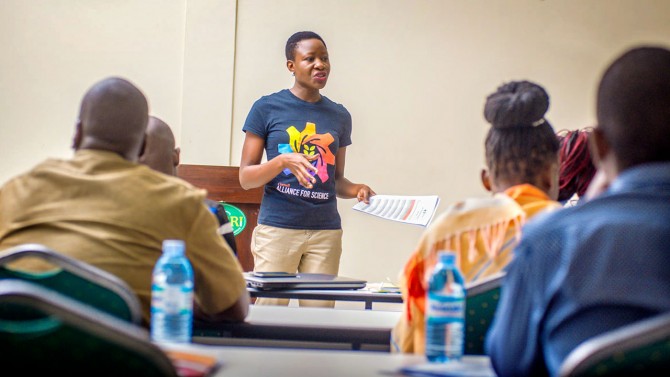Alliance for Science expands mission with $10M reinvestment
By Joan Conrow
The Cornell Alliance for Science is expanding its mission of science communication and advocacy, and broadening its commitment to diversity and inclusion, thanks to $10 million in new funding from the Bill & Melinda Gates Foundation.
The grant will support the alliance – a Cornell-based global communications initiative founded in 2014 to address misinformation around crop biotechnology – as it widens its focus to counter conspiracy theories and disinformation campaigns that hinder progress in climate change, synthetic biology and agricultural innovations.
“Science is the answer to the many challenges facing humanity, but science needs effective messengers,” said Sarah Evanega, director of the Alliance for Science (AfS) and faculty member in the Department of Global Development and School of Integrative Plant Science. “The COVID-19 pandemic is revealing the pervasiveness of misinformation in the public sphere and the critical need for a science-based approach to address the biggest challenges of our time.”
Under Evanega’s direction, the AfS has begun conducting original research that makes use of data gathered by its international media monitoring platform. She recently led a study that analyzed the misinformation topics shared by traditional media during COVID-19.
The reinvestment will also help the AfS fulfill its commitment to become more racially, geographically and gender inclusive in its staffing and programs.
“We are responding to the urgent need to address systemic racism in academia, especially STEM, by reflecting honestly on our own organization to take meaningful steps toward inclusivity and anti-racism in the global context in which we work,” Evanega said.
To that end, Patricia Nanteza, a 2015 AfS Global Leadership Fellow from Uganda, will assume leadership of the alliance’s innovative training programs. Over the past six years, the AfS has trained 796 science communicators from 48 countries through international short courses and its flagship 12-week fellows program, which historically has been held on Cornell’s Ithaca campus.
Nanteza will lead efforts to develop online and face-to-face training programs that reflect the organization’s expanded mission.
“An African-led, Africa-based training program will help us deepen our presence and engagement on the continent,” said Nanteza, who’s a science writer for the International Institute of Tropical Agriculture. “We are responding to our partners’ requests to offer more demand-driven training and we see this move as strengthening our real-time collaboration with key partners in Africa.”
The re-investment also provides new funding for the Dhaka-based Farming Future Bangladesh, an AfS initiative working to improve food security and nutrition in South Asia under the direction of Arif Hossain, a 2015 AfS Fellow from Bangladesh.
Evanega said the COVID-19 pandemic has highlighted an urgent need in the global agricultural community.
“We must address food security by giving smallholder farmers, many of them women, access to the innovative tools that can help them succeed and prosper in an increasingly unpredictable and hostile climate,” Evanega said. “This new investment in Cornell’s Alliance for Science reinforces the importance of working together to find inclusive, science-based solutions to the grave problems facing humanity and our planet.”
A version of this story appears on the College of Agriculture and Life Sciences’ website.
Joan Conrow is managing editor for the Cornell Alliance for Science.
Media Contact
Get Cornell news delivered right to your inbox.
Subscribe

